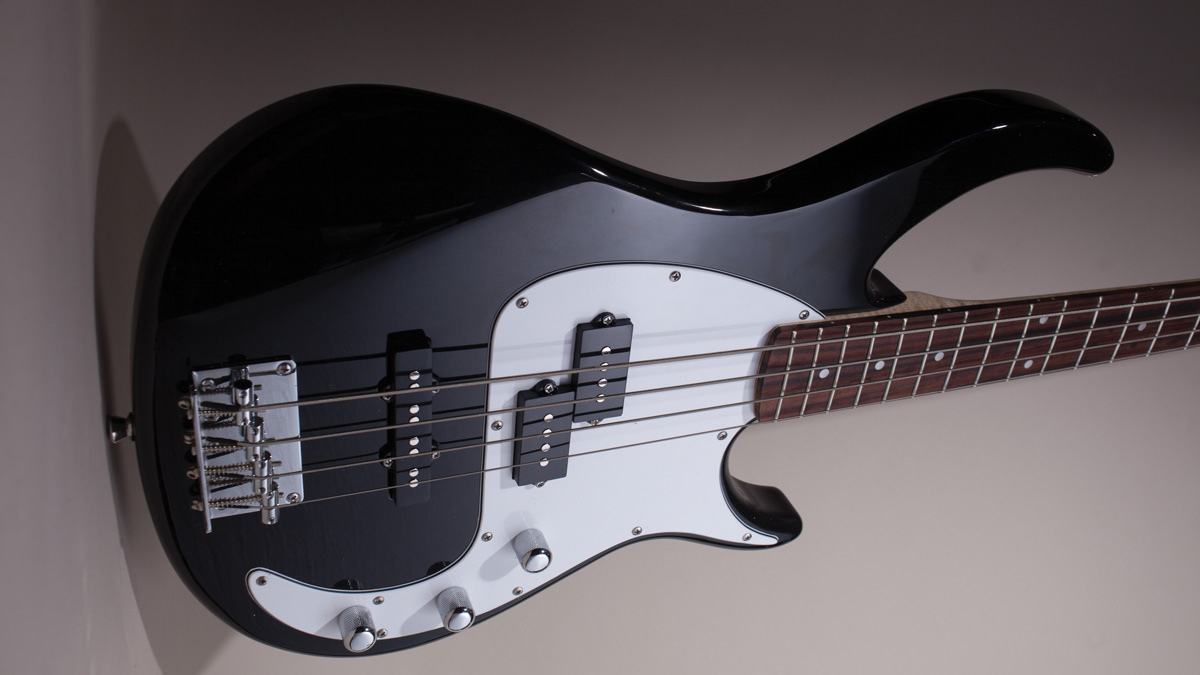MusicRadar Verdict
A wise investment if you want to see if bass playing is for you.
Pros
- +
A cheap beginner's bass that should appeal to those starting out. Two pickups give some tonal variety.
Cons
- -
Some shabby finishing.
MusicRadar's got your back
At a snip under £200, Peavey has undoubtedly opted for the 'function over frills' route for its new Milestone four-string, but that doesn't mean that basic playability has to be compromised.
A cheap bass doesn't have to be a poor instrument, after all - so does the Milestone blow us away or leave us wanting more for our money?
Build Quality
The Milestone is available in four colours but we've been blessed with the none-more-classic black gloss model, resplendent with a matching black headstock, white three-ply Precision-style scratchplate and chrome hardware throughout.
The curvaceous body is well rounded with suitable upper chamfer and rear contouring to improve comfort for the player, while the extended upper horn improves balance, despite a little headstock bias, and the deep lower cutaway offers decent access to the upper frets.
The slim C-shaped neck profile is very comfortable, the narrow nut dimensions give the neck a classic Jazz Bass feel and the skunk- stripe flame pattern on the rear of the satin finished neck is attractive. Unfortunately, the finish is quite rough to the touch near the headstock heel, and the fret finishing is rather shoddy, with sharp fret ends in evidence on both sides of the neck.
On a bass of this price, you obviously expect various features to be made to a price point, but basic finishing should be a given, no matter what. The 20-fret rosewood fingerboard comes with acrylic position markers on the front face and black side markers, a synthetic bone nut has been used and the classic Peavey headstock design is in full effect.
Plugging in, the bass sounded warm and welcoming with a good degree of old school thump about it, particularly from the split-coil pickup.
The split and single-coil pickup arrangement offers at least some tonal flexibility and being passive, the two volume/one tone control set isn't going to confuse anyone. The open-gear machine heads operate smoothly, as do the controls, and while the bridge is fairly standard with no frills, it does what it needs to do in a basic fashion.
Want all the hottest music and gear news, reviews, deals, features and more, direct to your inbox? Sign up here.
One feature worthy of discussion is the Peavey Powerplate, which is embedded into the back of the headstock to improve string vibration through the instrument - which in turn should increase the overall volume and sustain. We shall see!
Sounds
Passive instruments rely so much on the quality of their construction, the timbers and hardware and the strength and tonality of the pickups: with no onboard EQ to project the signal and tonal delivery, any shortcomings become rapidly apparent.
Acoustically, there was little natural resonance from the instrument and try as we might, we couldn't find any sort of tonal sweet spot. Despite being comfortable to wear and play, with reasonable playability, the bass came across as exactly what it is, a cheap production-line bass.
Plugging in, the bass sounded warm and welcoming with a good degree of old school thump about it, particularly from the split-coil pickup. The single-coil pickup at the bridge does exactly what you would expect, adding some brightness and twang, but it didn't bring the bass to life in any respect and in mixing the signal using each volume control, it became quickly apparent that this bass performs best with both pickups running at full whack.
The tone control brings some much-needed tonal variation to the sound palette, particularly useful if you play in a variety of styles. If classic, full-bodied bass tones are the order of the day, keep the tone control down but if you require some extra brightness for pick playing or any sort of percussive playing where you need the upper frequencies to stand out, crank that tone control up. Thankfully there is some gradation as the control is turned up, so you will hear a gradual change.
In all honesty, we were unable to hear any marked tonal impression that the Powerplate stamped on the Milestone's performance. We couldn't say that it made the bass sound better or gave it a favourable character, which is a shame. Whether that is down to the basic construction of the bass or the performance of the pickups is hard to say.
If you're starting out on your travels into the Kingdom of The Bottom End, the Peavey Milestone is aimed squarely at you. It plays well, is relatively comfortable and will get you up and playing quickly, which is no bad thing.
Some of the finishing is a little lacklustre: sadly at this price, that's not uncommon. If you buy this bass and then decide that alternatives would suit you better, then at least you haven't invested heavily. If you're a beginner, the Milestone is definitely worth investigation.
